| Srl | Item |
| 1 |
ID:
161235
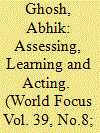

|
|
|
|
|
| Summary/Abstract |
Our environment has been steadily getting worse ever since human beings have begun to evolve on this planet. It has especially become worse after human beings evolved sufficiently to become large populations, exploiting their local environment through complex equipment and tools. Measuring this was not such an easy task. The tools required were not yet ready and neither were our conceptions of the environment detailed enough in their complexity.
|
|
|
|
|
|
|
|
|
|
|
|
|
|
|
|
| 2 |
ID:
154121
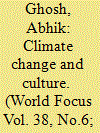

|
|
|
|
|
| Summary/Abstract |
Climate change and its effects have been regularly talked about end detailed by researchers, writers as well as common people of all colours and creeds. Today, many of the basic ideas of climate change have become part of the language and knowledge of the people in the street. Yet, there is often an element that is found to be missing in all the comments and discussions relating to climate change.
|
|
|
|
|
|
|
|
|
|
|
|
|
|
|
|
| 3 |
ID:
189598
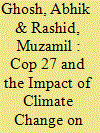

|
|
|
|
|
| Summary/Abstract |
Mountains are the water towers of South Asia and are the important source of the water for the major river systems in South Asia, providing water to millions of people. Melt water coming from these mountains is an important source to feed the rivers. However, Climate change is affecting both the precipitation patterns and glacial melting in South Asian mountains which have marked impacts on river flows, and may threaten the food security of people. In the past decades South Asia has experienced many climate changes including rapid glacier shrinking, reduction in snow cover, increase in floods, and irregularity in monsoons. We conclude that south Asia is vulnerable and the climate changes will affect it profoundly which could negatively impact the people living downstream of mountain areas. COP 27 in Sharm El Sheikh focused on the links between water and climate change and the actions required for combating climate change but the need is to not to debate only; but to act and build a sustainable world for all.
|
|
|
|
|
|
|
|
|
|
|
|
|
|
|
|
| 4 |
ID:
185383
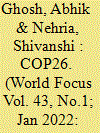

|
|
|
|
|
| Summary/Abstract |
The article is focused on the discussion of climate change and global warming in India with the increase of emission of GHG in COP26. COP26 (Conference of the Parties) was held at Glasgow, Scotland in November,
2021. The summit was the 26th meeting of world leaders to make solid measures to cope up with the rise of global temperatures.
|
|
|
|
|
|
|
|
|
|
|
|
|
|
|
|
| 5 |
ID:
193443
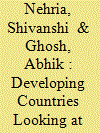

|
|
|
|
|
| Summary/Abstract |
The Leadership Group for Industry Transition (LeadIT 2.0) was co-launched by Prime Minister Narendra Modi and Prime Minister of Sweden, H.E. Mr. Ulf Kristersson, for the 2024–2026 terms in COP28. The Indian Prime Minister announced at the ceremony that LeadIT 2.0 will concentrate on low-carbon technology, co-development and transfer, equitable and inclusive industry transition, and financial support for emerging economies to undertake industry transition. The Green Credit Project has been envisioned as a way to effectively address the issue of climate change by providing incentives for voluntary pro-environmental efforts.
|
|
|
|
|
|
|
|
|
|
|
|
|
|
|
|
| 6 |
ID:
145381
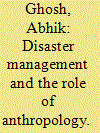

|
|
|
|
|
| Summary/Abstract |
Disaster management can only be as good as the subject and the personnel that are involved in the process. Without human beings as support groups, an anthropological model is of no practical use. Perhaps it is this grounded nature of its reality that gives its tool-kit the added sharpness, better and more skillful at its job.
|
|
|
|
|
|
|
|
|
|
|
|
|
|
|
|
| 7 |
ID:
193437
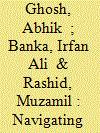

|
|
|
|
|
| Summary/Abstract |
As COP28 drew to a close in Dubai, it marked a pivotal moment in global climate negotiations, symbolising a unified commitment to shift away from all fossil fuels. India, playing a central role in shaping COP outcomes, skillfully navigated discussions, aligning its national priorities with the broader global need for climate action and opting for a transition from coal rather than a phased elimination. Despite India’s ongoing efforts in climate adaptation, projections indicate a substantial financial requirement of Rs 57 lakh crore for adaptation alone by 2030 in a “business as usual” scenario, emphasising the urgency for robust climate financing.
|
|
|
|
|
|
|
|
|
|
|
|
|
|
|
|
| 8 |
ID:
161239
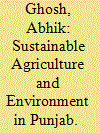

|
|
|
|
|
| Summary/Abstract |
David Ludden, (1999: 19) wrote, “agriculture is civilization at work on the land, humanizing nature and naturalizing the powers that human societies exert upon nature”. Agriculture is an art to obtain food from soil, and it gives humans an opportunity value nature. Agriculture is very fundamental process to the emergence of human society and culture. It is the primary source of income for the majority of the people of India. Agriculture predominantly influences the process and pace of economic development. Indian Agriculture sector contributes 17-18 per cent of the nation’s GDP and employs more than 50 per cent of total workforce in India.
|
|
|
|
|
|
|
|
|
|
|
|
|
|
|
|